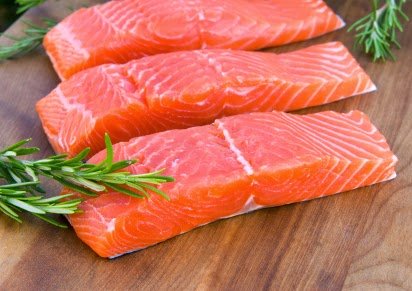
Salmon, from the family Salmonidae, related to other fish such as char, trout and grayling, has always been popular either served smoked as a starter or cooked in various ways as a main course. More recently, salmon has been slapped with the label of being a “superfood”.
What Makes Salmon a Superfood?
Salmon is rich in omega-3 fatty acids which can help to reduce the risk of cardiovascular disease. Other foods rich in omega-3 include nuts such as walnuts and flaxseeds. A less known fact is that salmon can also help with sun protection. Research suggests that one of the omega-3s found in salmon has UV protecting properties and can aid against skin damage.
The benefits of salmon’s omega-3s do not end there. The omega-3s found in salmon have been linked with improved brainpower in middle-aged adults.
Salmon is also rich in proteins. In 100g piece of salmon, there is roughly 20g of protein. Almost as much as a steak!
The Dark Side of Salmon the Super Pollutant
There are numerous reasons why salmon farming pollutes. Firstly, lots of feed is consumed by the salmon. The food pellets are thrown in the cages with scoops. There isn’t an even distribution of food and any uneaten food sinks. Uneaten food rots and turns into nitrogen and phosphorous. The increase in nitrogen and phosphorous levels pose a risk to mammals, fish, shellfish as well as other wildlife. In 2000, British Salmon farms produced a total of 7,500 tonnes of nitrogen. This is equivalent to the annual sewage of 3.2 million people.
The increase in nutrients lead to an increase in algae. These “algae bloom” can poison shellfish and other marine life, including farmed salmon.
Did You Know? To produce farmed fish such as salmon, it take about 3 times the weight of wild-caught fish. This is because farmed fish are fed on fish meal which is made from fishing for wild fish.
Since salmon are farmed in large numbers, it is easier for pests and disease to infest a salmon farm. The salmon louse is one such pest. It is essentially a salmon tick attaching itself to the host and feeding on the fish. A few salmon lice are enough to kill a salmon. In Scotland, nearly half of the salmon farms are infested with the salmon farmers’ enemy. The skin lesions and infections cost the Scottish farming industry £300m to try to help control the numbers of lice. Up to 12 other countries are affected by the salmon lice.
To combat this problem, toxic chemicals are used in the salmon cages in an attempt to reduce the number of lice. This only releases tonnes of chemicals into the oceans as the lice have become more resistant to the chemicals.
The Scottish salmon industry now wants to build the world’s biggest salmon farm. It would be able to farm 2million fish at a time and would crate as much waste as a city the size of Glasgow.
So, do you think salmon are a superfood or an ecological disaster?

Sources
https://www.theguardian.com/environment/2017/apr/01/is-farming-salmon-bad-for-the-environment http://www.telegraph.co.uk/news/uknews/1355936/Pollution-from-fish-farms-as-bad-as-sewage.html https://greatist.com/health/superfood-salmon
liked and followed :)
I will see salmon with another eye thanks to your post thanks a lot for sharing and keep on posting ;)
Congratulations @casimir! You have completed some achievement on Steemit and have been rewarded with new badge(s) :
Click on any badge to view your own Board of Honor on SteemitBoard.
For more information about SteemitBoard, click here
If you no longer want to receive notifications, reply to this comment with the word
STOP